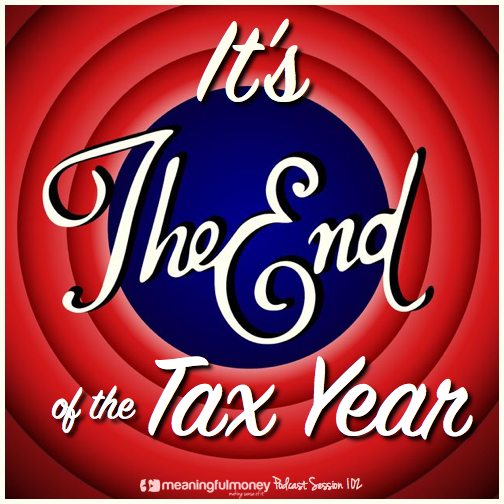
Here in session 102 we’re going to be talking about the end of the tax year and some of the things you could be thinking about. Even though the tax year is pretty much at the same time each year, it still takes many of us by surprise! In this session we’ll cover the main things to consider at this important planning time.
Podcast: Subscribe in iTunes | Play in new window | Download
If this show is of any use to you, it would help me massively if you would take the time to leave me a review on iTunes. This has a huge impact on keeping me near the top of the rankings, which in turns helps more people to find the show and to subscribe. I’ll remind you again at the end of the show, but if you want to do it right now, just click the button below:
Sponsor Message
 This podcast is brought to you with the help of Seven Investment Management, a firm of investment managers based in London. They specialise in multi-asset investing, bringing institutional investing techniques to ordinary people like you and me. 7IM put their name to my show and to my site because they believe in what I’m doing, trying to get decent, easy-to-understand financial information out to the world. I’m very grateful to them for their support.
This podcast is brought to you with the help of Seven Investment Management, a firm of investment managers based in London. They specialise in multi-asset investing, bringing institutional investing techniques to ordinary people like you and me. 7IM put their name to my show and to my site because they believe in what I’m doing, trying to get decent, easy-to-understand financial information out to the world. I’m very grateful to them for their support.
You can see what they’re up to at 7im.co.uk
Introduction
Ok, we’re all business this week. Let’s crack straight on with what you need to know first, followed swiftly by what you need to do at the tax year-end.
Everything you need to know
1 – The tax year-end is on 5th April – or is it?
Check deadlines with ISA and pension providers for getting your contributions in.
Good Friday is the 3rd April, and Easter Sunday the 5th, so the last working day of the tax year is 2nd April, making 1st April or 30th March your last day for getting stuff in the post.
2 – It’s an artificial deadline
No one is going to die if you miss the tax year-end. The worst that can happen is the taxman might get more tax out of you than they should.
It’s up to you how much sleep you lose over that. But we have a cardinal rule here on MeaningfulMoney:
Don’t do anything for tax reasons that you wouldn’t ordinarily be comfortable with.
Everything you need to do
1 – Use your ISA allowances
£15,000 per person per tax year, split in any proportion between cash and stocks and shares ISAs
2 – Use your CGT allowance
£11,000 per person per year
3 – Use your pension annual allowance
£40,000 per person, but there are other limits to be aware of
4 – Watch out for your child benefit
If you are earning over £50,000 and you have kids, you will be losing some or all of your child benefit. Consider pension contributions, charitable gifts or salary sacrifice to reduce the effect of this
5 – Use your gift exemptions for Inheritance Tax
£3,000 per donor per year to any one recipient. You can use last year’s allowance too if you didn’t use it then.
Summary
So then, five little tasks to think about in the next few days. But remember, don’t rush a financial decision that you might regret. If you already have a pension setup, then yes, do make a contribution. If not, then don’t rush to set up a pension just to make the tax year.
Any questions, leave a comment
Reviews
My thanks to RaccieRooRoo and Ann-G-49, both from the UK for their reviews this week – you are lovely people!
Next Session Announcement
Next time we'll be talking about the practicalities of the new pensions freedoms. It might sound like a good idea to strip out lump sums from your pension pot, but what effect will that have? I’ll be chatting to Abraham Okusanya, who you may remember from Session 74 to find out more about this vital, and very timely subject.
If you have a question on this subject, or any other financial query that you want answering here on the show, then the best way to do that is to leave me a voicemail at meaningfulmoney.tv/askpete





Leave a Reply